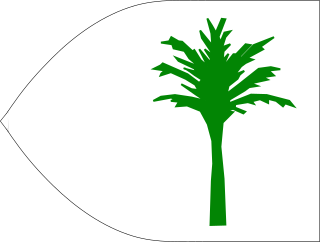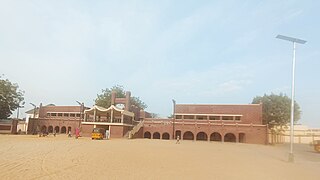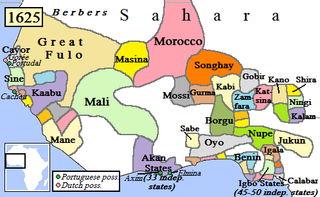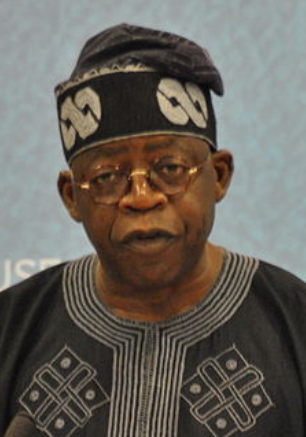
The Kanem–Bornu Empire existed in areas which are now part of Nigeria, Niger, Cameroon, Libya and Chad. It was known to the Arabian geographers as the Kanem Empire from the 8th century AD onward and lasted as the independent kingdom of Bornu until 1900.

Borno State is a state in the North-East geopolitical zone of Nigeria. It is bordered by Yobe to the west for about 421 km, Gombe to the southwest for 93 km, and Adamawa to the south while its eastern border forms part of the national border with Cameroon for about 426 km. Its northern border forms part of the national border with Niger for about 223 km, mostly across the Komadougou-Yobe River, and its northeastern border forms all of the national border with Chad for 85 km ,.It is the only Nigerian state to border up to three countries. It takes its name from the historic emirate of Borno, with the emirate's old capital of Maiduguri serving as the capital city of Borno State. The state was formed in 1976 when the former North-Eastern State was broken up. It originally included the area that is now Yobe State, which became a distinct state in 1991.

The Borno Emirate or Sultanate, sometimes known as the Bornu Emirate, is a traditional Nigerian state that was formed at the start of the 20th century. It is headed by the descendants of the rulers of the Bornu Empire, founded before 1000. The rulers have the title Shehu of Borno. The traditional emirate of Borno maintains a ceremonial rule of the Kanuri people, based in Maiduguri, Borno State, Nigeria, but acknowledged by the 4 million Kanuri in neighbouring countries.
Biu is a town and a Local Government Area (LGA) in southern Borno State of Nigeria. The town is the administrative center of the LGA and was once the capital of the Biu kingdom, and is now capital of the Biu Emirate. Biu lies on the Biu Plateau at an average elevation of 626 meters. The region is semi-arid.
Bayo is a Local Government Area of Borno State, Nigeria. Its headquarters are in the town Fikayel.
Dikwa is a town and a local government area in Borno State, Nigeria.
Kwaya Kusar is a Local Government Area of Borno State, Nigeria. Its headquarters are in the town of Kwaya Kusar.
Shani is a Local Government Area of Borno State, Nigeria. Its headquarters are in the town of Shani.

Nigerian traditional rulers often derive their titles from the rulers of independent states or communities that existed before the formation of modern Nigeria. Although they do not have formal political power, in many cases they continue to command respect from their people and have considerable influence in their community.
The Dikwa Emirate is one of the successor states to the old Bornu Empire, a traditional state within Borno State, Nigeria. It was established in 1901 at the start of the colonial period after the Bornu empire had been partitioned between the British, French and Germans.

The Potiskum Emirate is a traditional state in Nigeria, with headquarters in Potiskum, Yobe State. The emir holds the title "Mai".
Kogu is a large village in Biu LGA, of southwestern Borno State, in northeastern Nigeria. Kogu is located on a tributary of the Yangari River about 34 kilometres (21 mi) southwest of the town of Biu.

The Kano Emirate Council is a traditional state in Northern Nigeria with headquarters in the city of Kano, the capital of the modern Kano State. Preceded by the Emirate of Kano, the council was formed in 1903 after the British pacification of the Sokoto Caliphate. The borders of the Emirate are contiguous with Kano State.
Shehu Mustapha Idrissa Timta was a Nigerian leader who served as the third emir of Gwoza from October 1981 until his death in May 2014. He was killed in an attack by Boko Haram terrorists on May 30, 2014.
Mandaragirau is a town in Borno State, Nigeria.
The 2023 Borno State gubernatorial election took place on 18 March 2023, to elect the Governor of Borno State, concurrent with elections to the Borno State House of Assembly as well as twenty-seven other gubernatorial elections and elections to all other state houses of assembly. The election—which was postponed from its original 11 March date—was held three weeks after the presidential election and National Assembly elections. Incumbent APC Governor Babagana Umara Zulum has been renominated by his party.
Muktar Aliyu Betara is a Nigerian accountant and lawmaker, first elected to the House of Representatives of the Federal Republic of Nigeria in 2007 to represent the Biu/Bayo/Shani and Kwaya Kusar Federal Constituency of Borno State in the North-eastern region of Nigeria. He was the Chairman, House Committee on Appropriations in the 9th Assembly which held its first session on 11 June 2019. This marks his fourth tenure as a member of the House of Representatives.
Babur and Bura people also known as Pabir are part of the ethnic groups in Nigeria. They are located in Biu, Hawul, Kwaya Kusar, Shani and Bayo of Borno State. They can also be found in Garkida, Gombi local government of Adamawa State.

The 2023 Nigerian presidential election in Borno State will be held on 25 February 2023 as part of the nationwide 2023 Nigerian presidential election to elect the president and vice president of Nigeria. Other federal elections, including elections to the House of Representatives and the Senate, will also be held on the same date while state elections will be held two weeks afterward on 11 March.







